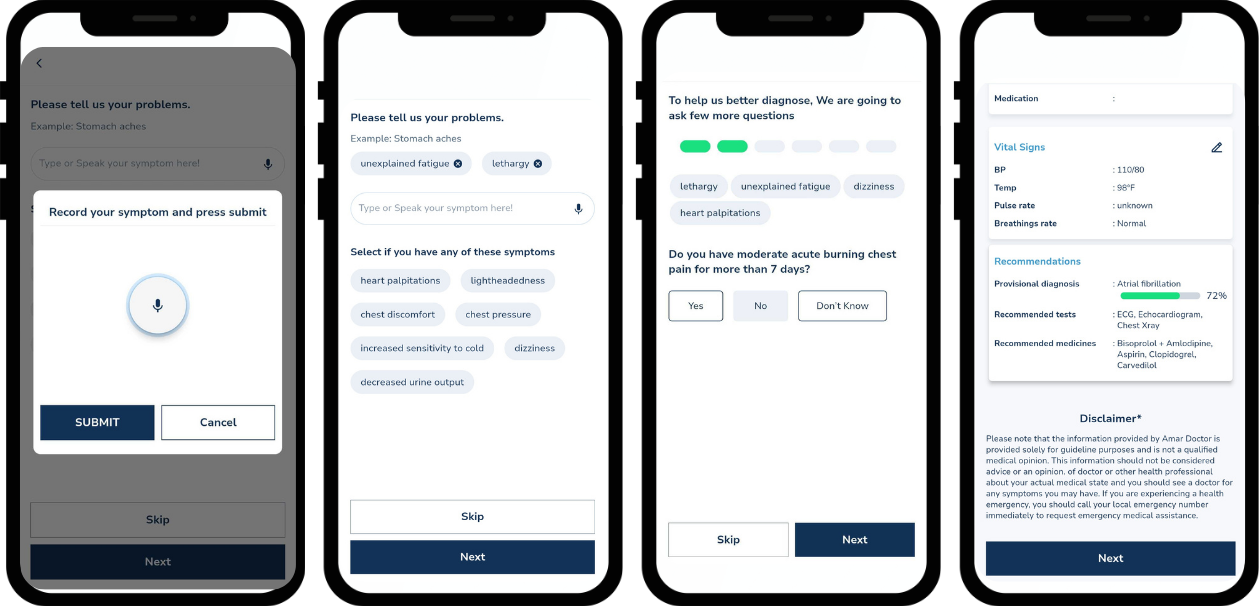About
As an R&D Engineer at MedAi Limited, I design AI-driven healthcare solutions focused on human-centered computing. With over 4+ years of experience, I have built culturally-aware, linguistically-inclusive solutions for the digital healthcare platform: AmarDocor, improving primary care access for underserved communities in South Asia.
I’m passionate about working at the intersection of cutting-edge AI research and real-world challenges. My interests include machine learning, mobile health, health informatics, and human-computer interaction, with a strong emphasis on ethical, inclusive, and human-responsive technologies.
I earned my Bachelor’s degree in Computer Science and Engineering from Bangladesh University of Engineering and Technology (BUET). For my thesis, I worked under the supervision of Professor Dr. Md. Monirul Islam. on Bengali OCR Using Deep Learning, where I built a dataset from printed Bengali documents and trained deep learning model using CNNs, RNNs, and LSTMs, achieving an accuracy of 87.3%.
Research Interests: Health Informatics, Digtial Health, HCI, Human-Centered and Explainable AI, Accessible Computing, Multimodal Learning
Professional Experience
Research & Development Engineer | MedAi Health
- Designed and developed AmarDoctor, an AI-powered, multilingual telemedicine platform improving healthcare accessibility for diverse user groups.
- Built the Symptom Checker and Clinical Decision Support System algorithms, enabling intelligent triage and diagnostic assistance for physicians.
- Architected and deployed a scalable cloud infrastructure for AmarDoctor using AWS services to ensure performance and reliability.
- Developed a TypeDB-based knowledge graph to model and store relationships among diseases, symptoms, patients, and consultations.
- Led the technical team, overseeing API design, and backend development using Django REST Framework, ensuring modularity and maintainability.
Teaching | Bangladesh Institute of Science & Technology
- Instructed undergraduate students in Microprocessor and Assembly Language Programming (lecture and laboratory components).
- Tutored students in advanced coursework: Computer Graphics, Network and Information Security.
Research & Publications
Currently, I am exploring the use of Large Language Models (LLMs) in generating electronic health records from patient-provided data and utilizing generative AI to create personalized short videos summarizing patient consultations with prescription guidance for better comprehension and adherence in low-literacy populations. In addition, I lead the AmarDoctor tech team, which has successfully delivered remote patient care solutions for individuals across various backgrounds, including those with limited health literacy and technological access.
Preprints
1. Nazmun Nahar; "Healing Through Generative Vision: A Multimodal AI Framework for Trauma-Informed Therapeutic Visualization". (Accepted at AI-Health 2026).
This idea paper proposes a generative AI framework for trauma-informed therapy, focusing on personalized video synthesis to support inner child healing. By combining therapist-guided prompts with emotion-aware generation, the system aims to create emotionally resonant content that complements therapeutic work-especially for individuals with emotional numbing or limited imaginative capacity.
2. Nazmun Nahar; Ritesh Harshad Ruparel; Shariar Kabir; Sumaiya Tasnia Khan; Shyamasree Saha; Mamunur Rashid. "AmarDoctor: An AI-Driven, Multilingual, Voice-Interactive Digital Health Application for Primary Care Triage and Patient Management to Bridge the Digital Health Divide for Bengali Speakers." arXiv preprint arXiv:2510.24724. paper (2025)
3. Shariar Kabir; Nazmun Nahar; Mamunur Rashid; Shyamasree Saha. "Automatic Speech Recognition of Biomedical Data in Bengali Language." arXiv preprint arXiv:2406.12931. paper (2024)
Key Projects
AmarDoctor - AI-powered Digital Health Platform
Extended Case StudyProblem: Lack of AI-driven primary care access for Bengali speakers, engendering healthcare accessibility barriers for South Asian populations.
Solution: Designed and developed the AmarDoctor platform, featuring a colloquial-language symptom checker and a clinical decision support system that streamlines consultations and reduces physician burnout.
Impact: A first-of-its-kind AI-powered platform that has served over 12,000 Bengali-speaking users, delivering more than 3000 personalized healthcare consultations as of now.
Award: AmarDoctor was selected as a Solver Team in the 2024 MIT Solve Global Health Equity Challenge for its AI-powered, culturally inclusive telemedicine platform serving Bengali-speaking communities. The award recognizes its impact in advancing equitable access to primary care.
Symptom Checker and Clinical Descision Support System
Problem: Many patients face difficulty articulating their symptoms and identifying the right specialist.
Solution: Designed a symptom checker that suggests relevant symptoms, asks targeted follow-up questions, and provides provisional diagnoses along with specialist recommendations.
Impact: SAchieved 87% diagnostic accuracy validated against physician assessments using 185 simulated patient cases, significantly improving triage efficiency and accessibility to care.

Medical History-Driven Dietary Recommendation System.
Problem: Gap between visual food recognition technology and personalized medical dietary counseling for chronic disease management.
Solution: Integrated computer vision-based food classification with medical knowledge systems for condition-specific dietary filtering and recommendation generation.
Impact: Enables real-time food guidance automation, potentially improving patient adherence to medical dietary restrictions to manage chronic conditions.

Medical Assistant Chatbot Using Rasa
Problem: Limited accessibility to preliminary health assessment tools through natural conversational interfaces, particularly for mental vs. physical health triage.
Solution: Developed intent-based conversational AI using RASA framework with dynamic dialogue management, implementing looped questioning system for symptom classification.
Impact: Demonstrated feasibility of automated health triage through conversational interfaces, enabling preliminary classification between mental and physical health concerns.
Bengali OCR Using Deep Learning
Problem: Lack of effective optical character recognition systems for Bengali printed text, hindering digitization of Bengali literature and documents.
Solution: Developed novel Bengali word image dataset from printed documents, designed and trained deep neural network architectures for character sequence recognition.
Impact: Achieved 87.3% word recognition accuracy, contributing to low-resource language NLP research and digital preservation of Bengali texts.
SaaS Client Management System
Problem: Managing scalable, secure API access for healthcare service providers.
Solution: Built a JWT-authenticated client management platform with customizable service packages and time-based access control.
Impact: Powers scalable B2B healthcare API delivery with robust access and subscription management.
